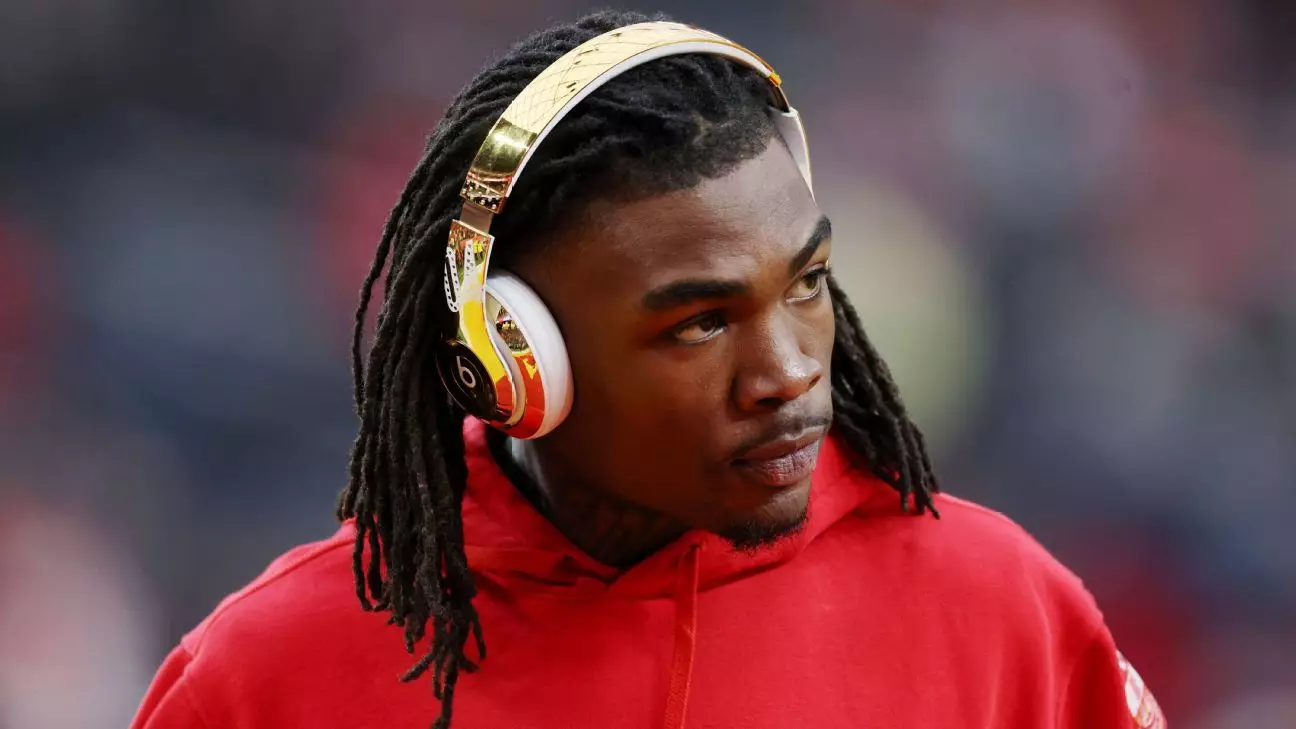The recent legal developments surrounding Kansas City Chiefs wide receiver Rashee Rice expose a troubling pattern of personal irresponsibility that threatens to overshadow his athletic promise. While Rice’s talent on the field was evident, his recent actions demonstrate a dangerous disconnect between the responsibilities of fame and the importance of personal accountability. The fact that a young athlete could be involved in a high-speed, multi-vehicle collision—an act of recklessness that could have resulted in tragic loss of life—raises questions about the values guiding his decisions. Rice’s actions, evident in his speeding at 119 mph and subsequent plea deal, serve as a disturbing reminder that talent alone does not confer maturity or good judgment.
Recklessness in the realm of sports often emerges from a false sense of invincibility, particularly among young athletes who are lauded as heroes before they have fully matured emotionally. Rice’s choice to speed in a Lamborghini is not just a matter of poor judgment but a reflection of a broader cultural issue where admiration can sometimes breed complacency and entitlement. His reckless behavior ignites a critical conversation about the importance of personal responsibility, especially when young individuals hold significant influence and reach. Dangerous driving is not a trivial offense; it’s a dangerous gamble that can devastate lives—yet, in this case, Rice was fortunate that no fatalities occurred.
Accountability and the Culture of Forgiveness in Sports
While Rice’s immediate legal repercussions—30 days in jail, probation, and restitution—are technically consequences, they fall short of addressing the deeper issue of his role as a representative of a community and a sport. That he paid over $115,000 in restitution illustrates some acknowledgment of guilt, but monetary compensation cannot erase the broader moral failure. His public apology, although seemingly sincere, feels limited in scope when considering the potential risk he posed to innocent lives. Forgiveness in sports culture often comes swiftly, but it can sometimes enable a pattern of behavior that neglects real accountability.
The NFL’s stance, pending disciplinary action, exemplifies this tension. League policies are often reactive, balancing public relations concerns with the need to enforce discipline. Yet, the league’s delay in imposing sanctions allows for a dangerous normalization of reckless behavior—an implicit message that athletic achievement can, at times, overshadow the gravity of personal misconduct. When athletes are given room to “mature” after endangering others, it inadvertently fosters an environment where accountability is secondary to redemption narratives. This is especially troubling in a sport that requires focus, discipline, and respect for safety.
Potential for Growth or a Sign of Deeper Issues?
Rice’s injury in Week 4 last season was a setback that could have served as a wake-up call to focus on his future. Sadly, his involvement in such a high-stakes incident suggests that, rather than maturing, he might be trapped in the same youthful recklessness that led to his injury. For someone with his platform—a rising star in a league that champions discipline—this episode could be a defining moment if he chooses to learn from it. But if ignored, it risks becoming a recurring pattern, stalling his development both as a person and a professional.
Society often looks to athletes as role models, but there is a responsibility that comes with visibility. Rice has been given opportunities many do not receive—recruitment, fame, and fortune—yet his actions threaten to squander those privileges through a lack of foresight. True maturity involves understanding the impact of one’s choices beyond personal convenience or thrill-seeking. It requires a commitment to safety, respect for others, and embracing the consequences when mistakes occur.
Given his acknowledgment of the damage, there remains hope that Rice is genuinely remorseful. Yet, words alone cannot undo the harm caused or erase the need for consistent, demonstrable change. His future, both on and off the field, depends heavily on whether he recognizes the gravity of his actions and takes proactive steps to advocate for safer behavior. Only then can he hope to reconcile his potential with his responsibility as a public figure.
The Double Standard and the Path Forward
The broader society’s response to such incidents exposes a troubling double standard—athletes often receive leniency when their transgressions are seen through the prism of their athletic contributions. While this may preserve league image or fan investment, it undermines the notion of justice and the importance of ethical conduct. If we accept that young men like Rice can escape serious consequences simply because they perform on game day, we risk perpetuating a culture where recklessness is excused and accountability is deferred.
The challenge lies in balancing compassion with firmness. Athletes must be held accountable, not just for legal reasons but to reinforce the values of discipline, safety, and respect. Rice’s case should serve as an opportunity—not to persecute but to promote growth. His potential as a role model is contingent upon his willingness to learn from this episode and to prioritize the well-being of those around him. Only through genuine introspection and sustained behavioral change can he shed the image of a reckless star and step into the role of a responsible leader within the sport and his community.

Leave a Reply